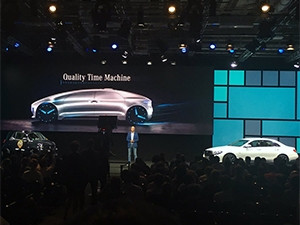
Daimler AG, which owns Mercedes-Benz, announced at IFA 2016, the electronics trade fair in Berlin, that it will start experimenting with a delivery system that uses car boots as post-boxes.
The company is partnering with DHL and some online retailers to test the new logistical service. The aim is to 'free up' people's time, by eliminating the need to stand in a post office line or ask a neighbour to collect their delivery.
Dr Dieter Zetsche, CEO of Daimler AG and head of Mercedes-Benz, said at IFA: "We deal intensively with the question of how the car can help make people's lives easier. If the car, for example, receives the mail, the customer will have more time for what's really important."
The initial project will use Mercedes-Benz subsidiary Smart cars.
The person ordering will select 'smart ready to drop' at checkout when ordering from an online retailer like Amazon. They will then supply their Smart car's details.
The delivery company will receive the details, through an app, and be able to track where the car is by using GPS. When the car is located, the deliverer will be sent a code that opens the back of the car. Once the parcel is inside and the car closed again, another code will be used to lock it. The delivery can only be completed when the car is locked.
The testing will initially take place in the German city of Stuttgart, and then Cologne, Bonn and Berlin. If it works, the company will extend the concept offering to other cities and cars.
More than wheels
This test is part of the motoring company's ethos of creating cars that 'work' for the customer when not in use, said Zetsche.
Another feature in the pipeline allows the car's sensors to 'talk to each other' and let cars know where there is a free parking spot.
Zetsche says ultimately, when cars are fully autonomous, they will become "quality time machines", where people rest and catch up on work while commuting.
He predicted future cars will play three supportive roles: an office manager, personal assistant and fitness coach.
In preparation for this, the company is launching an in-car office system later this year to help make time spent in cars more efficient. The system will let users use Skype and WeChat safely while driving.
"The more work you get done on the road, the less time you will have to spend in the office," noted Zetsche.
To help cars become more of a personal assistant, the new system will have a 'concierge' service that will do things like recommend restaurants or make a booking for the driver.
Lastly, it will become a fitness coach by pairing with drivers' wearable devices to monitor their stress and comfort levels, and adjust seat positioning or air temperature accordingly.
Share